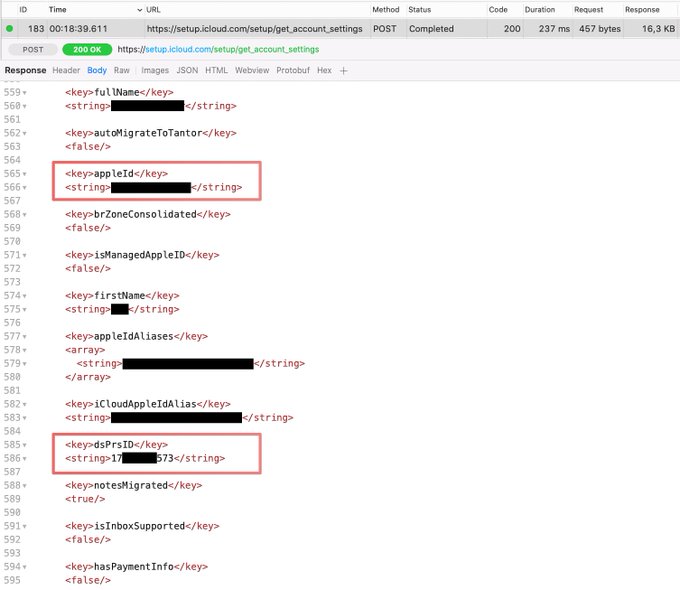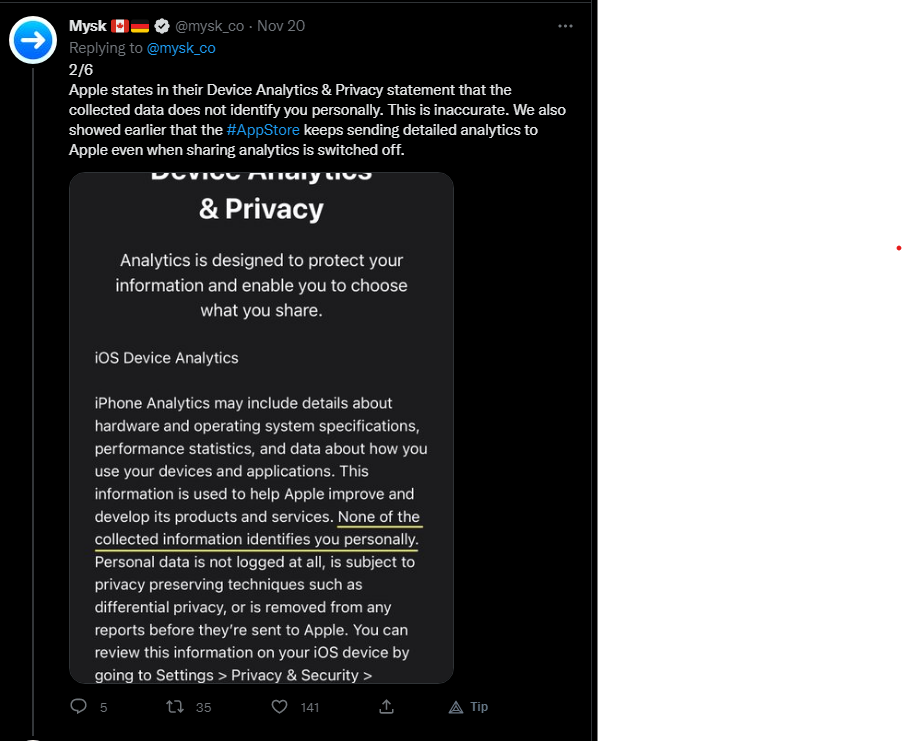https://www.apple.com/legal/privacy/data/en/apple-advertising/
Apple-delivered advertising helps people discover apps, products, and services while respecting user privacy. Apple’s advertising platform is designed to protect your information and give you control over how we use your information. Our advertising platform doesn’t share personally identifiable information with third parties.
Ads that are delivered by Apple’s advertising platform may appear on the App Store, Apple News, and Stocks. Apple’s advertising platform does not track you, meaning that it does not link user or device data collected from our apps with user or device data collected from third parties for targeted advertising or advertising measurement purposes, and does not share user or device data with data brokers.
Contextual Information
Contextual information may be used to serve ads to you, such as:
We create segments, which are groups of people who share similar characteristics, and use these groups for delivering targeted ads. Information about you may be used to determine which segments you’re assigned to, and thus, which ads you receive. To protect your privacy, targeted ads are delivered only if more than 5,000 people meet the targeting criteria.
We may use information such as the following to assign you to segments:
Apple’s advertising platforms receive information about the ads you tap and view against a random identifier not tied to your Apple ID.
Apple does not share any personally identifiable information with third parties. We are obligated to make certain non-personal information available to strategic partners that work with Apple to provide our products and services, help Apple market to customers, and sell ads on Apple’s behalf. No Apple Pay transactions or Health app data is accessible to Apple’s advertising platform, or is used for advertising purposes. Apple does not know or make available to advertisers information about your sexual orientation, religious beliefs, or political affiliations.
Advertising Preferences
About This Ad
To understand why a specific ad was shown to you on the App Store, Apple News, or Stocks, tap the Ad button on the ad. This will present the segments and other data, such as demographic information, that were used to determine which ad you received.
Ad Targeting Information
To see information about you that may be used to deliver targeted ads by Apple’s advertising platform, including the segments that you are in.
To see this information on your iOS or iPadOS device, go to Settings > Privacy & Security > Apple Advertising and tap View Ad Targeting Information. On Mac, go to System Settings > Privacy & Security > Privacy, click Apple Advertising, then click View Ad Targeting Information.
If you believe information about you is inaccurate, you can update your Apple ID account information.
Location-Based Ads
If you allow App Store or Apple News to access to your location, Apple’s advertising platform may use the approximate current location of your device to provide you with geographically targeted ads on the App Store and on Apple News.
You can opt out of location-based app functionality including for advertising on your iOS or iPadOS device by going to Settings > Privacy & Security > Location Services, and either tapping to turn off Location Services or selecting App Store or News from the list of location-aware switches and setting it to Never. On Mac, go to System Settings > Privacy & Security > Privacy, click Location Services, and deselect either “Enable Location Services” or “News.”
Apple’s advertising platform does not receive location-based information when you turn off Location Services on your device.
Personalized Ads
If Personalized Ads is turned on, Apple’s advertising platform may use your information to serve ads that are more relevant to you. Turning off Personalized Ads will prevent Apple from using this information for ad targeting. It may not decrease the number of ads you receive, but the ads may be less relevant to you.
You can turn off Personalized Ads on your iOS or iPadOS device by going to Settings > Privacy & Security > Apple Advertising and tapping to turn off Personalized Ads. On Mac, go to System Settings > Privacy & Security > Privacy, click Apple Advertising, and deselect Personalized Ads. The Personalized Ads option may be unavailable if you are a minor, have a managed account, or are in a location where Apple does not deliver advertising to its apps.
Preventing Fraud and Other Malicious Activity
To help identify and prevent fraud and other malicious activity within ads, Apple’s advertising platform may use information about your searches on the App Store, the ads you view and tap, and the apps you purchase and download from ads. This information is collected against a random identifier not tied to your Apple ID.
At all times, information collected by Apple will be treated in accordance with Apple’s Privacy Policy, which can be found at www.apple.com/privacy
Published Date: September 12, 2022
Apple Advertising & Privacy
Apple-delivered advertising helps people discover apps, products, and services while respecting user privacy. Apple’s advertising platform is designed to protect your information and give you control over how we use your information. Our advertising platform doesn’t share personally identifiable information with third parties.
Ads that are delivered by Apple’s advertising platform may appear on the App Store, Apple News, and Stocks. Apple’s advertising platform does not track you, meaning that it does not link user or device data collected from our apps with user or device data collected from third parties for targeted advertising or advertising measurement purposes, and does not share user or device data with data brokers.
Contextual Information
Contextual information may be used to serve ads to you, such as:
- Device Information: Your keyboard language settings, device type, OS version, mobile carrier, and connection type.
- Device Location: If Location Services is turned on and you’ve granted permission to the App Store or Apple News apps to access your location, your location may be used to serve you geographically relevant ads. Your precise device location is not stored by Apple’s advertising platform, and profiles are not constructed from this information. To access these settings, go to Settings > Privacy & Security > Location Services.
- App Store: Your query when you perform a search, and information about the page you are viewing may be used to serve you a relevant ad.
- Apple News and Stocks: The type of story you read may be used to select appropriate ads.
We create segments, which are groups of people who share similar characteristics, and use these groups for delivering targeted ads. Information about you may be used to determine which segments you’re assigned to, and thus, which ads you receive. To protect your privacy, targeted ads are delivered only if more than 5,000 people meet the targeting criteria.
We may use information such as the following to assign you to segments:
- Account Information: Your name, address, age, gender, and devices registered to your Apple ID account. Information such as your first name in your Apple ID registration page or salutation in your Apple ID account may be used to derive your gender. You can update your account information on the Apple ID website.
- Downloads, Purchases & Subscriptions: The music, movies, books, TV shows, and apps you download, as well as any in-app purchases and subscriptions. We don’t allow targeting based on downloads of a specific app or purchases within a specific app (including subscriptions) from the App Store, unless the targeting is done by that app’s developer.
- Apple News and Stocks: The topics and categories of the stories you read and the publications you follow, subscribe to, or turn on notifications from.
- Advertising: Your interactions with ads delivered by Apple’s advertising platform.
Apple’s advertising platforms receive information about the ads you tap and view against a random identifier not tied to your Apple ID.
Apple does not share any personally identifiable information with third parties. We are obligated to make certain non-personal information available to strategic partners that work with Apple to provide our products and services, help Apple market to customers, and sell ads on Apple’s behalf. No Apple Pay transactions or Health app data is accessible to Apple’s advertising platform, or is used for advertising purposes. Apple does not know or make available to advertisers information about your sexual orientation, religious beliefs, or political affiliations.
Advertising Preferences
About This Ad
To understand why a specific ad was shown to you on the App Store, Apple News, or Stocks, tap the Ad button on the ad. This will present the segments and other data, such as demographic information, that were used to determine which ad you received.
Ad Targeting Information
To see information about you that may be used to deliver targeted ads by Apple’s advertising platform, including the segments that you are in.
To see this information on your iOS or iPadOS device, go to Settings > Privacy & Security > Apple Advertising and tap View Ad Targeting Information. On Mac, go to System Settings > Privacy & Security > Privacy, click Apple Advertising, then click View Ad Targeting Information.
If you believe information about you is inaccurate, you can update your Apple ID account information.
Location-Based Ads
If you allow App Store or Apple News to access to your location, Apple’s advertising platform may use the approximate current location of your device to provide you with geographically targeted ads on the App Store and on Apple News.
You can opt out of location-based app functionality including for advertising on your iOS or iPadOS device by going to Settings > Privacy & Security > Location Services, and either tapping to turn off Location Services or selecting App Store or News from the list of location-aware switches and setting it to Never. On Mac, go to System Settings > Privacy & Security > Privacy, click Location Services, and deselect either “Enable Location Services” or “News.”
Apple’s advertising platform does not receive location-based information when you turn off Location Services on your device.
Personalized Ads
If Personalized Ads is turned on, Apple’s advertising platform may use your information to serve ads that are more relevant to you. Turning off Personalized Ads will prevent Apple from using this information for ad targeting. It may not decrease the number of ads you receive, but the ads may be less relevant to you.
You can turn off Personalized Ads on your iOS or iPadOS device by going to Settings > Privacy & Security > Apple Advertising and tapping to turn off Personalized Ads. On Mac, go to System Settings > Privacy & Security > Privacy, click Apple Advertising, and deselect Personalized Ads. The Personalized Ads option may be unavailable if you are a minor, have a managed account, or are in a location where Apple does not deliver advertising to its apps.
Preventing Fraud and Other Malicious Activity
To help identify and prevent fraud and other malicious activity within ads, Apple’s advertising platform may use information about your searches on the App Store, the ads you view and tap, and the apps you purchase and download from ads. This information is collected against a random identifier not tied to your Apple ID.
At all times, information collected by Apple will be treated in accordance with Apple’s Privacy Policy, which can be found at www.apple.com/privacy
Published Date: September 12, 2022
![[H]ard|Forum](/styles/hardforum/xenforo/logo_dark.png)

